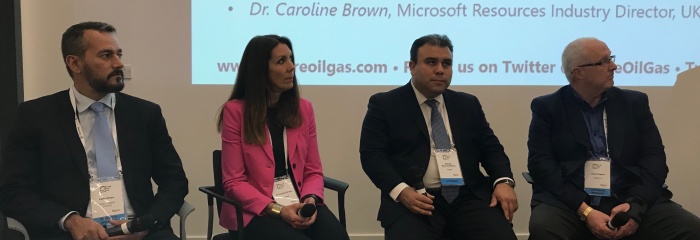Caroline Brown, GBM, Microsoft discusses the impact real-life insights will have on the O&G industry of the future.

How will having access to real-time insights help shape the future of the industry?
This is about really optimising every aspect of the Upstream business and realising significant cost savings and efficiency gains. There is common agreement that oil price instability will likely persist for some time so the industry really needs to consider how it can dramatically reduce operating expense. And moving to real-time insights delivers this in a couple of key ways. Firstly, it’s about freeing up people from spending their time gathering and collating data, validating data integrity and reporting on that data. Then secondly it’s about connecting all areas of exploration, production and operations and using deep data analytics to answer questions such as where to drill and how to optimise drilling trajectories and flow rates, how to reduce or even eliminate scheduled and unplanned facility shutdown, how to detect, monitor and report on environmental compliance and how to ensure that the most stringent safety measures are applied on facilities to better protect everyone because remote monitoring of operations no longer requires personnel to travel to sites without first knowing what and where a problem has occurred and whether or not it’s a safe working environment
Where is it likely to have the biggest impact?
Every aspect of Upstream business will benefit from application of real-time insights, whether it’s during exploration, production or operations over the lifetime of the reservoir. I do think that the area of the industry that is perfectly placed to deliver material cost savings and efficiency gains from application of real-time insights in current market conditions, is operations. In a report by Accenture in 2017, it was estimated that 75% of breakdowns and equipment outages on an asset could be avoided by applying predictive maintenance versus scheduled and reactive maintenance and earlier this year, the IOT for All report for IoT applications in this industry cited that a single pump failure can cost a company as much as $300k USD and a lost day of production. Enterprise Asset Tracking allows companies to integrate assets into one unit to remotely monitor multiple wells or sites simultaneously, and allow facilities to react to problems through predictive or even prescriptive maintenance, preventing expensive equipment failure, wasted money and manpower.
How easy will it be to transition to increased use of AI as means of building knowledge as opposed to conventional methods?
The biggest hurdle for the industry to overcome is in integrating data as it relates to data quality, connectivity to the systems and devices at the edge where the data is being generated and the ability to take this data and analyse it in real-time with operational benefits. Facilities can generate more than 1TB of raw data per day and this causes challenges with how to get insights from their data when equipment is remotely located with limited network connectivity or high bandwidth costs that prohibit sending data to the cloud. The industry is exploring ways of addressing this connectivity challenge in a couple of ways. Firstly, by considering alternatives to wired connectivity solutions and secondly by gathering and analysing information close to the physical world where the data resides. At Microsoft we call this the Intelligent Edge – the continually expanding set of connected systems and devices that can deliver real-time insights and immersive experiences that are highly responsive and contextually aware.
What opportunities will this generate for the industry in the future?
This is a hugely exciting time in the industry, the digitalisation of the Upstream business will allow companies to optimise, save time, money and increase safety. With environmental stewardship becoming an ever-greater priority, real-time insights offers a way to continually monitor and track adherence to environmental obligations, reduce spills and leakages of emissions and optimise production in ways that are simply unachievable with today’s manual, disconnected processes. As the industry looks to managing the energy transition to lower carbon alternatives, real-time insights have a role to play in monitoring today’s production, identifying non-compliance with environmental obligations and identifying areas for improvement, elimination of unnecessary waste and providing accurate and transparent reporting to regulators, legislators and the public.
Sign up
Signup to receive the latest news from Future Oil & Gas directly to your inbox
Stay informed about events, speakers and programme and get the news and insights from the cutting edge of digital technologies servicing the oil and gas industry.












Anonymous / 11-Jun-2019